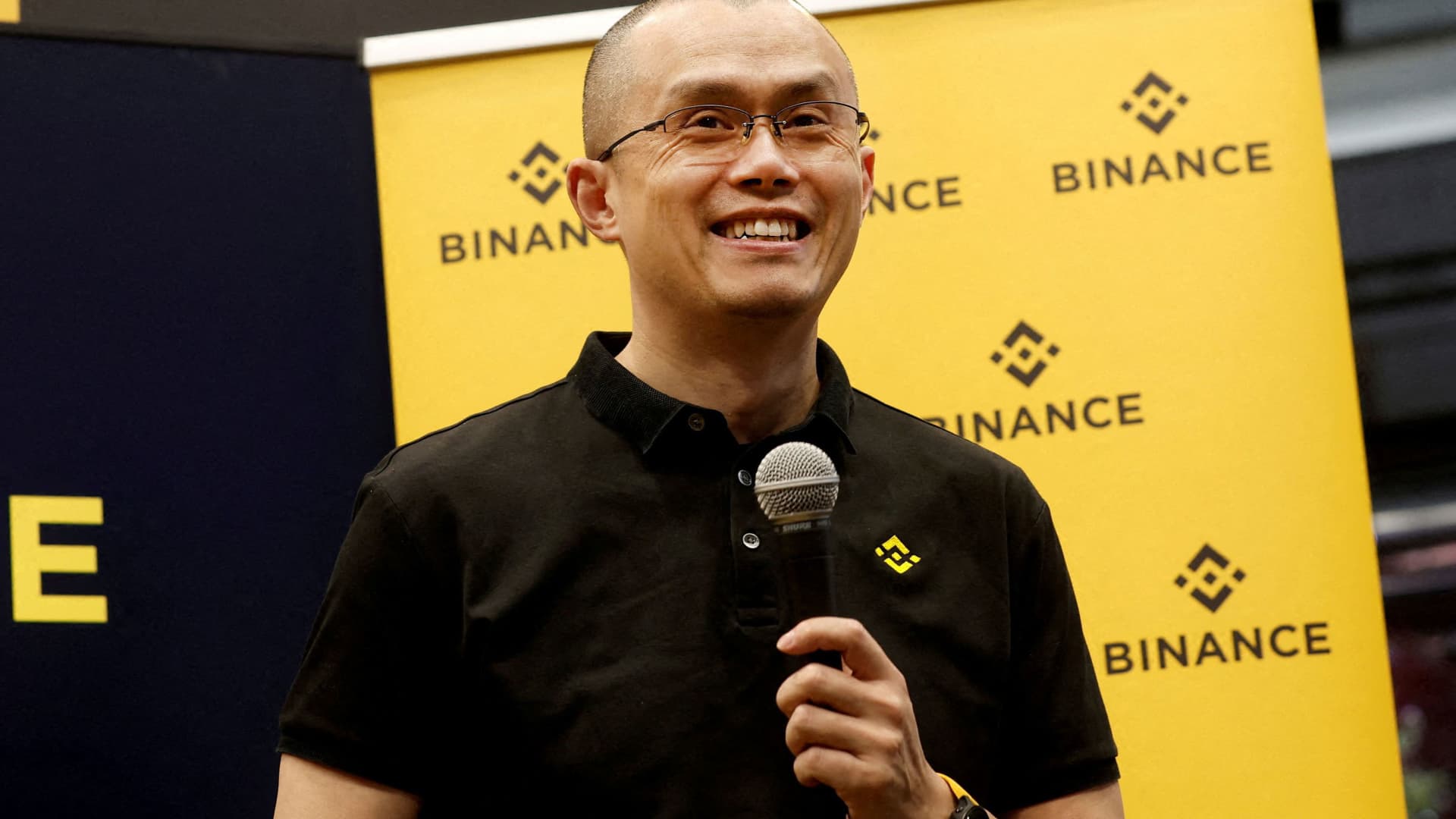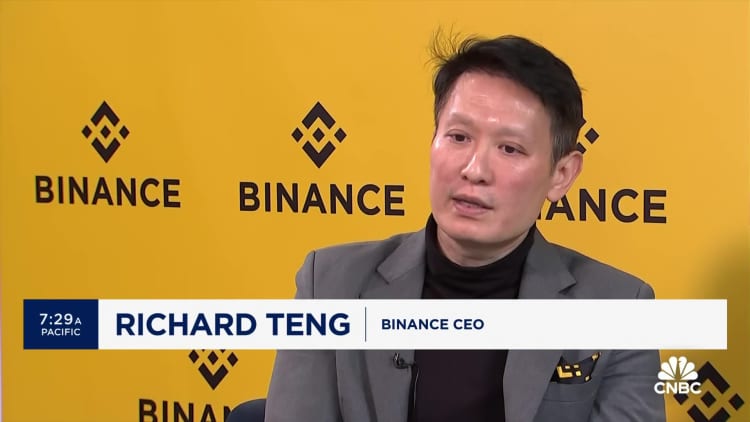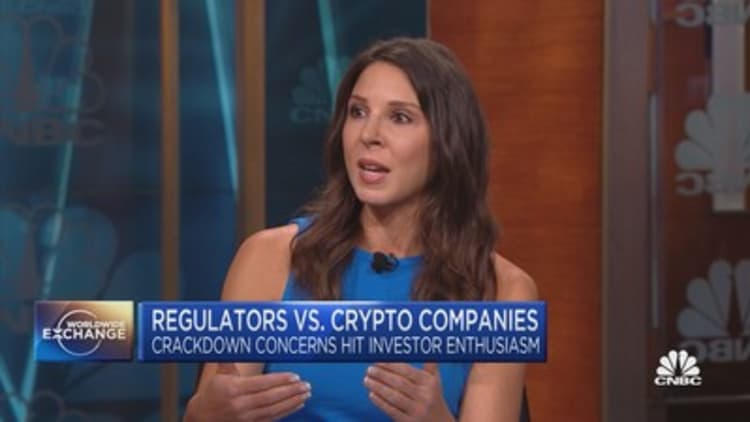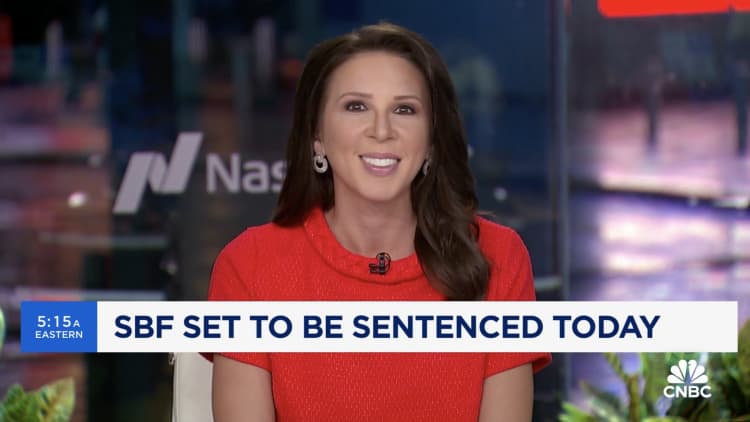

Zhao Changpeng, founder and chief executive officer of Binance, attends a conference at Porte de Versailles exhibition center in Paris, France June 16, 2022.
Benoit Tessier | Reuters
Changpeng Zhao, the founder and former CEO of crypto exchange Binance, heads to a Seattle courtroom on Tuesday to learn whether the crimes he admitted to committing will land him in prison for an extended sentence.
In November, Zhao pleaded guilty to enabling money laundering at Binance. As part of his plea deal with the Department of Justice, Zhao agreed to step down as CEO. For months, U.S. District Judge Richard Jones has been weighing the appropriate punishment for Zhao, also known as CZ.
Once a titan of the crypto sector, Zhao grew Binance into the world’s largest centralized crypto exchange globally. The company held assets of more than $65 billion by the time he stepped down. Unlike rival exchange FTX, which collapsed into bankruptcy when founder Sam Bankman-Fried was criminally charged, Binance has continued to operate.
Assets on the Binance platform totaled more than $122 billion, according to blockchain data firm Nansen, a roughly 88% jump that follows a sharp increase in crypto prices in recent months.
Prosecutors say Zhao violated U.S. law on an “unprecedented scale,” according to their sentencing memorandum to the court, and that he showed a “deliberate disregard” for Binance’s legal responsibilities, operating the exchange on a “Wild West” model.
Zhao is accused of willfully failing to implement an effective anti-money laundering (AML) program as required by the Bank Secrecy Act, and of allowing Binance to process transactions involving proceeds of unlawful activity, including between Americans and individuals in sanctioned jurisdictions.
Binance processed a whopping $18.1 trillion worth of trading volume in 2023, according to data from CCData, a crypto market data firm.
Around 80% — or $14.4 trillion — of that came from derivatives products like futures contracts, while the remaining $3.7 trillion came from spot trading. Derivatives trading is a key part of Binance’s business.
Zhao has agreed to pay a $50 million fine in addition to the $4.3 billion in fines and forfeiture that Binance was ordered to pay for violating the U.S. Bank Secrecy Act and sanctions on Iran. The action was a joint effort by the Justice Department, the Commodity Futures Trading Commission and the Treasury Department, while the SEC, which brought its own suit against the exchange, was notably absent.
The government is asking for a sentence of three years, double the high end of the guidelines range to “reflect the gravity of his crimes,” the prosecutors’ memo says.
Zhao’s lawyers have asked for five months’ probation. They say Zhao has accepted responsibility for dodging AML requirements, and that he has a history of philanthropy and community service. Additionally, he’s already spent more than five months in the U.S., away from family, since pleading guilty.
More than 160 of Zhao’s supporters, including family members, Binance customers, and Emirati royalty, have written notes to the court to appeal for mercy.
Prison time likely
Most experts who spoke to CNBC about the upcoming sentencing predict Zhao will spend some time behind bars.
“This is a high-profile case and the judge will feel pressure not to be soft during sentencing,” Former federal prosecutor Neama Rahmani told CNBC. He expects a sentence of a year or two.
Braden Perry, a former senior trial lawyer for the CFTC, said federal sentencing guidelines provide a framework but allow judges some discretion.
“For CZ, a first-time nonviolent offender, the sentencing guidelines call for an advisory range of 10 to 16 months,” said Perry, currently a partner at law firm Kennyhertz Perry.
Working in Zhao’s favor, Perry said, is that the defendant never went to trial, saving judicial and prosecutorial resources, and that he accepted responsibility and settled with multiple agencies, all concessions that might influence the judge’s decision.
“I believe the judge will acknowledge the vast scale of potential suspicious transactions and the prior lax AML program but recognize the efforts and remediation taken,” Perry said. “Taking into account all the factors, I predict a guideline sentence with a term of incarceration. This will deter yet account for the guilty plea and all other factors used in the sentencing decision.”
Yesha Yadav, law professor and associate dean at Vanderbilt University, is looking for the judge to impose a sentence “in the low single digits – perhaps three years.” However, that could include minimal time in prison and the rest on probation.
Yadav suggested that Zhao will benefit from Binance’s contrast to FTX, which was “revealed to have been a criminal enterprise.“
“While Binance has been convicted of extremely serious charges, it still remains an operational, albeit weakened, business that continues to attract customers and is looking to revive its fortunes by focusing on compliance under a monitorship regime,” Yadav said.
Former federal prosecutor Paul Tuchmann also expects some prison time due to the failure to implement AML requirements, as well as the volume of funds that flowed through Binance without being subject to such controls.

“While he is a first-time offender, those factors I just mentioned are likely to outweigh the lack of criminal history,” Tuchmann said. “The need for general deterrence in the crypto industry, and the financial sector generally, is so great, that I assume that DOJ will take the position, and a judge will likely agree, that a message needs to be sent through this sentence that the consequences for violating these rules can’t just be seen as a cost of doing business.”
Los Angeles corporate law attorney Tre Lovell said a shorter sentence, in the range of five to seven months, is likely, along with extended probation.
Lovell added that, unlike Bankman-Fried, who was convicted of fraud and sentenced to 25 years in prison, Zhao hasn’t been charged with fraud or other crimes deserving of a longer sentence.
“In addition, his letter to the judge does reflect remorse, discusses his making of poor decisions, and indicates that the Binance platform has instituted strict anti-money laundering controls at his direction,” Lovell said.
David Weinstein, a former federal and state prosecutor who now practices as a corporate compliance and white collar defense attorney at Jones Walker, said prison sentences represent an important deterrent.
“I think the sentence will end up just under a year,” he said.
WATCH: Bankman-Fried sentencing





